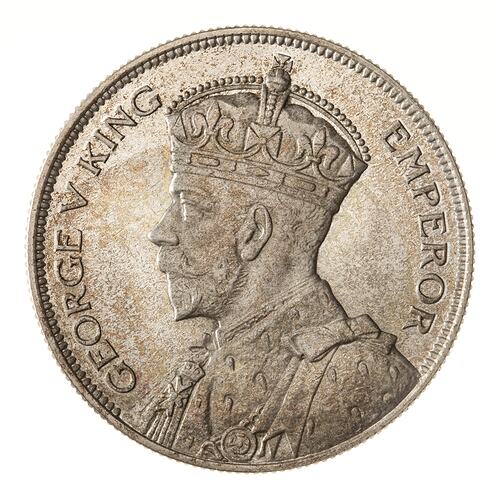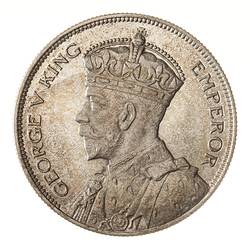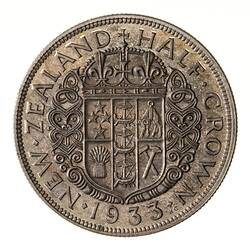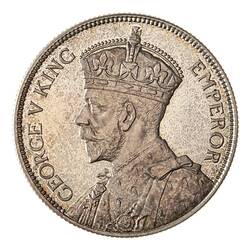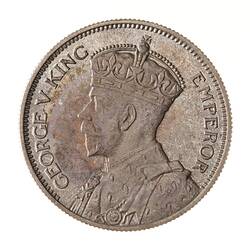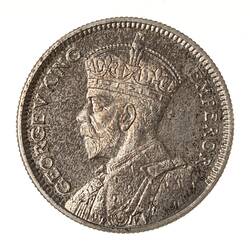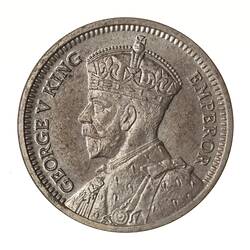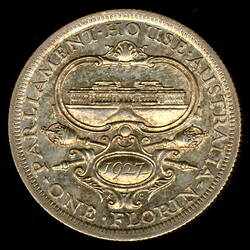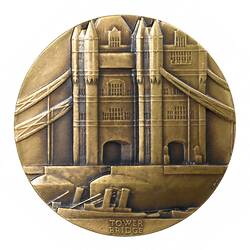Summary
Proof 1/2 Crown, Issued by New Zealand, 1933
Minted by Royal Mint, London
Obverse Description
Crowned bust of George V facing left (extends to rim); around, GEORGE V KING EMPEROR (by Percy Metcalf)
Reverse Description
Shield of Arms of the Dominion of New Zealand on their shield (quartered with the Southern Cross, a wheat sheaf, a lamb suspended by a ribbon and mining hammers crossed divided by three ships) surmounted by the Royal Crown and surrounded by ornamentation inspired by Maori carvings; around, NEW ZEALAND HALF CROWN; below, 1933; in small letters to right of date the artist's initials K.G. ([George] Kruger Gray).
Edge Description
Milled
Significance
The silver coins from 3 pence to half crown denominations dated 1933 were the first coins issued by the Dominion of New Zealand. Prior to this date the coinage of Great Britain circulated in New Zealand (by agreement seignorage accruing from the placement of British coins into circulation in New Zealand was shared between the British and New Zealand governments). Problems with this system arose in the early 1930s when the value of the pound sterling moved higher than that of New Zealand. It became profitable to remove British coin from circulation in New Zealand and return it to Britain. At the same time Australian silver coin was imported. Embargoes failed to change either situation and in July 1931 a private Bill was introduced to Parliament recommending a local coinage. This eventually became the New Zealand Coinage Act 1933.
Discussions between Britain and New Zealand on the mechanics of introducing the new coinage and the removal of the old took place between 1931 and 1933. The new coinage would be struck on the British silver standard of that time, .500 fine, and New Zealand agreed that the Royal Mint would re-strike all British coins then circulating in New Zealand to the New Zealand designs. Australian silver coins were also sent to London for melting, not because either government accepted liability for any nominal value of the Australian pieces, but because they were still being struck at the old .925, sterling silver, quality.
Initially the Royal Mint and the New Zealand Numismatic Society worked together on designs and Kruger Gary and Percy Metcalf prepared drawings. These were believed to have been approved by the New Zealand Prime Minister who was in London as a delegate to the World Economic Conference. However, a committee had been established in New Zealand, apparently including James Berry, and this committee forwarded new scetches to London in 1933. Kruger Gray was then given the task of converting these drafts to workable dies. The first denomination shipped was the half crown (in October 1933) followed by sixpences in December. Some florins were struck in 1933 but not shipped until 1934 while the 3 pence and shilling denominations, though bearing the date 1933 were not struck until 1934. The crown, designed to commemorate the signing of the Treaty of Waitangi, was postponed until requirements for the more important circulating denominations were filled, in 1935.
The obverse design for all denominations, a crowned head of King George V, was that newely modelled by Percy Metcalf and authorised for use on the Southern Rhodesia coinage from 1932.
In addition to the working strikes, the Royal Mint also produced about 20 proof copies of each denomination as record pieces.
More Information
-
Collecting Areas
-
Acquisition Information
Transfer from National Gallery of Victoria (NGV), 15 Mar 1976
-
Date Issued
1933 AD
-
Issued By
Reserve Bank of New Zealand, New Zealand, 1933
'The Coinage Act, 1933 governed the currency, coinage and legal tender in New Zealand, and meant that British coin ceased to be legal tender as at 1st February 1935. New Zealand then became the last and most remote of the self-governing dominions of the British Commonwealth to introduce its own coinage.'. Source: http://www.rbnz.govt.nz/currency/money/0094086.html -
Artist
-
Artist
Percy Metcalfe CVO - Royal Mint, London, Great Britain, 1932
-
Denomination
-
Series
-
Material
Silver
-
Axis
12
-
Classification
-
Category
-
Discipline
-
Type of item
-
Dimensions
32 mm (Outside Diameter), 14.1 g (Weight)
-
Shape
Round
-
References
KM#5 63rd Annual Report of the Deputy Master and Comptroller of the Royal Mint, 1932, p.8 64th Annual Report of the Deputy Master and Comptroller of the Royal Mint, 1933, p.6-8
[Book] Bruce, Colin R. 2009. 2009 Standard Catalogue of World Coins 1901 - 2000., 1542 Pages
-
Keywords
